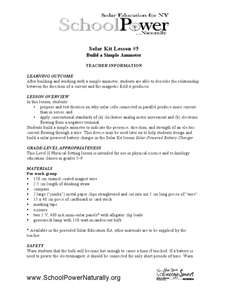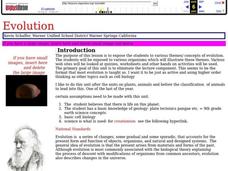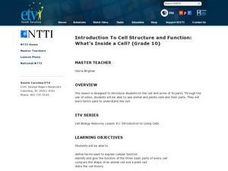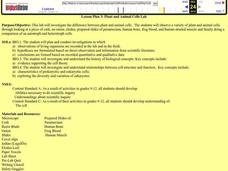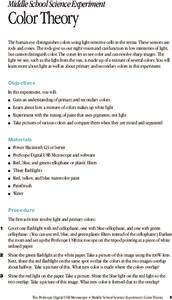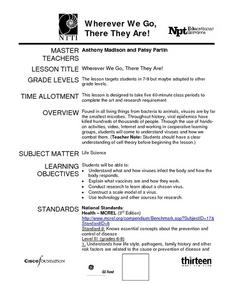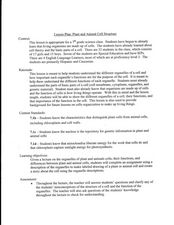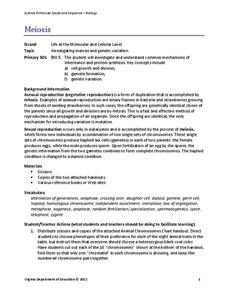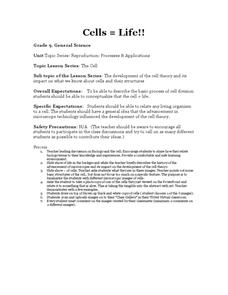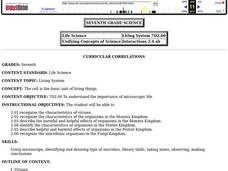Curated OER
Hierarchy Theory and Biotic Hierarchy
Students examine the hierarchy theory and biotic organization by playing a teacher-created card game matching groups of items, such as organelles, in suits of four. They discuss the reasons for their hierarchical organization of the...
Curated OER
The Human Cheek Cell
Students list the parts of cell theory and describe and define vocabulary. In this cell activity students complete a handout that includes sketching a cell.
Curated OER
Solar Kit Lesson #5 - Build a Simple Ammeter
Emerging electricians build a simple ammeter for making measurements on an electric current. They test the placement of solar cells in both series and parallel circuits and examine the magnetic field produced by the movement of electrons...
Curated OER
Evolution
Explore the concept of evolution and cell biology; your class can work in groups to use the internet to view websites on evolution, take a quiz, and complete a lab activity.
Howard Hughes Medical Institute
The Making of the Fittest: The Birth and Death of Genes
Adaptations must be made as environments change. This fabulous presentation features Icelandic icefish, a transparent, scaleless specimen that even has colorless blood. Genetics and adaptations concepts are explored as scientists study...
Curated OER
WHAT IS A CELL?
Young scholars explore the function and structures of cells, including plant and animal cells. They explore cell parts including cell wall, ribosomes, chromosomes, nucleoid, plasmids, flagella, pilli, and plasma membrane, cel
Curated OER
Cell Theory, Plant And Animal Cell Comparison
Tenth graders study plant and animal cells. In this investigative lesson students draw their own animal cells and label them.
Curated OER
Introduction To Cell Structure and Function: What's Inside a Cell?
Tenth graders are introduced to the cell and some of its parts. Through the use of video, 10th graders see animal and plants cells and their parts. They learn terms used to explain the cell.
Curated OER
Plant and Animal Cells
Students investigate the difference between plant and animal cells. They observe a variety o plant and animals cells by looking at a piece of cork, an onion, elodea, prepared slides of paramecium, human bone, frog blood, and human...
Curated OER
Color Theory
Students are able to gain an understanding of primary and secondary colors. They are able to explore about how a mixture of colors makes up white light. Students are able to experiment with the mixing of paint that uses pigments, not...
Curated OER
Cell Organelles
Young scholars explore biology by researching living cells. In this living organism lesson, students participate in a role-playing activity in which all the young scholars in class form one plant cell by portraying specific parts of a...
Curated OER
Wherever We Go, There They Are!
The central video for this lesson is not available through the included resource link. However, the activity that simulates the passing of a virus through a population is impacting and the other resource links are invaluable. Use this...
Curated OER
What Do Bread and Beer Have in Common?
Students listen to an explanation of yeast cells and how they effect bread and beer. They discuss the ways alcohol affects the human body and participate in an indirect observation about cell respiration in yeast-molasses cultures.
Curated OER
Gumdrop Crystal Models
A great way to learn about molecular structures is to make a model. Gumdrops and toothpicks are used to construct crystal models. The models are based on theories of crystal shapes that occur because of positive and or negatively charged...
Curated OER
Regents High School Examination: Living Environment 2005
The 2005 version of the Regents High School Examination in the area of ecology is as comprehensive as previous years' exams. It consists of 40 multiple choice questions on everything from the structure of DNA to the interactions within...
Curated OER
Cell Structure and Function
Learners compare the organelles present in plant and animal cells. In this biology lesson, students create an analogy to easily remember their assigned organelles. They also research their function and write a creative story.
Curated OER
Plant and Animal Cell Structure
Seventh graders identify the different parts and functions of the cell. For this biology lesson, 7th graders make a labelled diagram of either a plant or animal cell. They write a story about it.
Curated OER
Meiosis
Using yarn and chenille stems, lab groups collaborate to model mitosis and meiosis. Brief background information and a vaguely written procedure comprise this outline. More instruction needs to be provided to learners about cell division...
Curated OER
Gaia: The Wisdom of the Earth
Learners are introduced to Gaia theory of natural homeostasis. They graph Earth's temperatures over time, construct terrariums or monitor the outdoor environment. Related videos titles are suggested, but may be outdated. The objectives...
Curated OER
Cells=Life!
Ninth graders share what they know about cells. In this biology lesson, 9th graders study different microscopic images of the cell. They draw one and explain to their partner why they chose that image.
Curated OER
Notes on Cell Organelles
Students record information and write journal entries on the structure and function of cell organelles while viewing a Powerpoint presentation.
Curated OER
Regents High School Examination PHYSICAL SETTING CHEMISTRY 2006
The 2006 version of the Regents High School Exam is just as thorough as the rest of them! Assess chemistry learners on an entire year's curriculum when they take this thirteen page test.
Curated OER
Introduction to Biology
Students study cell theory and the link between it and technology. In this cell theory lesson students examine the importance of cell theory.
Curated OER
Cells
Seventh graders look up pictures of viruses or pictures of models of viruses. Using pipe cleaners, beads, Styrofoam or other available materials make models of these shapes. They then observe a demonstration to show the effect of Tobacco...




